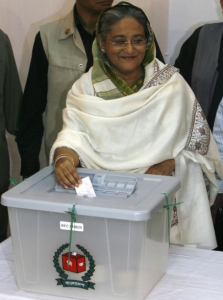
Last Thursday, a court in Bangladesh revoked the charter of the political party Jamaat-e-Islami (see news reports here and here). According to the petitioners who requested the ruling, some aspects of Jamaat’s charter contradicted Bangladesh’s constitution, particularly Jamaat’s promotion of a “religious” agenda that contravenes Bangladesh’s foundation as a secular nation. Unless the ruling is overturned or Jamaat revises its charter, it will not be able to field candidates in the upcoming January 2014 elections. Coincidentally, Jamaat leaders have also recently been charged and, in some cases at least, convicted of crimes committed during the 1971 war with West Pakistan that gave East Pakistan (now Bangladesh) its independence, which Jamaat had opposed.
The recent election in Iran, whose candidates had to be vetted by the Election Commission and the Guardian Council (which only approved 8 of an initial 678 presidential candidate applicants), generated articles such as BBC’s “Conservatives Dominate Narrow Field,” which began, “By the standards of democratic countries, presidential elections in Iran are neither free nor fair.” Such rhetoric is absent from most reports on the Bangladeshi ruling against Jamaat. Perhaps the differences reflect the greater interest in Iran than Bangladesh among English language media, but the difference may reflect how those excluded in Bangladesh have fewer ideological commonalities with many of us than those excluded in Iran. This possibility suggests that many European and American public figures and media sources employ the language of democratic principles when applying those principles furthers particular ideological interests and conveniently ignore those principles when presumably undemocratic actions serve their interests. Responses to the ouster of the democratically elected government in Egypt have a similar tone, including US Secretary of State John Kerry’s recent statement that the military’s move against Morsi was “restoring democracy”.
Whether or not you agree with these developments, “Democracy” is a category of convenience.

To update statements about Egypt, Senator McCain asserted that the events in Egypt were a coup (http://www.huffingtonpost.com/2013/08/06/mccain-graham-egypt_n_3716270.html). In response, a spokesperson for the interim government rejected that categorization and told Reuters, “We don’t want foreign intervention to be imposed on us.” Isn’t “foreign intervention” also a term used strategically? I doubt this spokesperson would include the US aid that calling the ousting of Morsi a coup could threaten (see Russell McCutcheon’s post https://edge.as.ua.edu/russell-mccutcheon/the-c-word/) as “foreign intervention” that his government does not want.